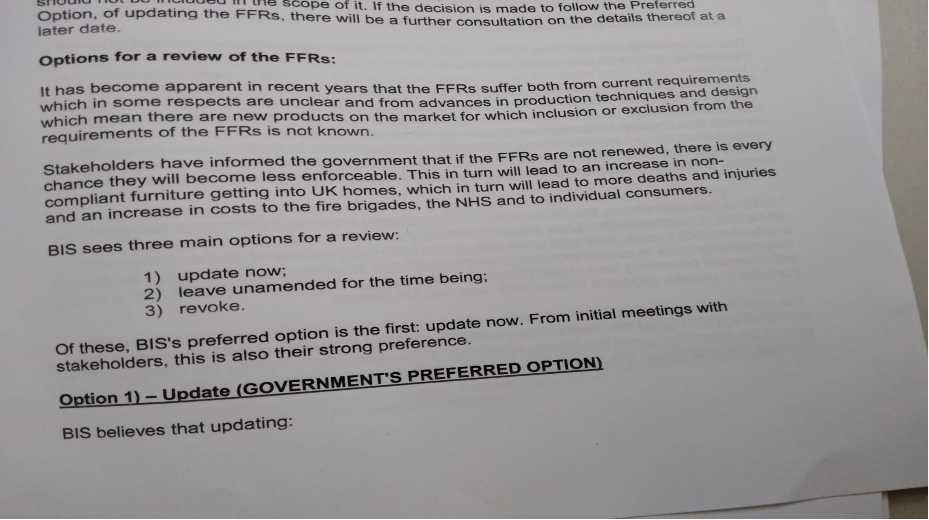It was sent in 2010 which was when the review formally began. However, for a few years prior to this there had been a lot of communication, meetings, emails, etc, between the Department and stakeholders, so this meeting did not come out of the blue for anyone. For example, the previous year I had contacted all key stakeholders asking them for their views on how a review could save money and improve fire safety. On the basis of their feed-back I wrote to our minister at the time asking him to approve a review, i.e. on the basis that stakeholders told us it would save around £35m a year; and he agreed.
So, here, the Department is announcing that this meeting will discuss the three options for the regulations: update now; leave unattended for the time being; revoke. And the Department states that the first is its favoured option and is also the one favoured by stakeholders. And indeed that was the view expressed and agreed to at this meeting.
So the decision was: update now. In 2010.
Move forward to 2023 and the Department has just gone out to consultation, asking for views on its preferred approach to the regulations: THIRTEEN YEARS AFTER IT WAS TOLD BY EVERYONE THAT THE REGS NEEDED UPDATING NOW. In the meantime, not a single aspect of the regulations has been updated.
And here's the key about this 2010 meeting: at the time, everyone believed the regulations worked. Nevertheless, as you can see, stakeholders were still concerned that the regulations were out of date, with products on the market for which no one knew if they were in or out of scope.
Even worse, stakeholders informed the government that if the regulations were not updated, there was a good chance they would become unenforceable. Which of course would mean they were useless. In 2014, Trading Standards informed the Department that because it had proven the regs are unfit for purpose, they would not be enforcing them any more. Two sets of reasons, therefore, that they are unenforceable; as indeed has been proven by the fact that for many years now Trading Standards has not brought a single enforcement (apart from basic mis-labelling) under these regulations.
There is of course no mention of any of this in the government's lastest consultation. Furthermore, as detailed in my previous blog post, the government is not telling anyone that the new regulations will be unactionable until they receive the accompanying Standards; and British Standards has informed everyone that Standards take five years to develop. Then you add another few years for consultation and embodiment (and a bit more for reasons I cannot reveal at the moment) and you're looking at another 8 years at least before anything changes.
Which means no change until 2031 at the earliest.
TWENTY-ONE YEARS since everyone agreed the regulations needed changing now!

 RSS Feed
RSS Feed